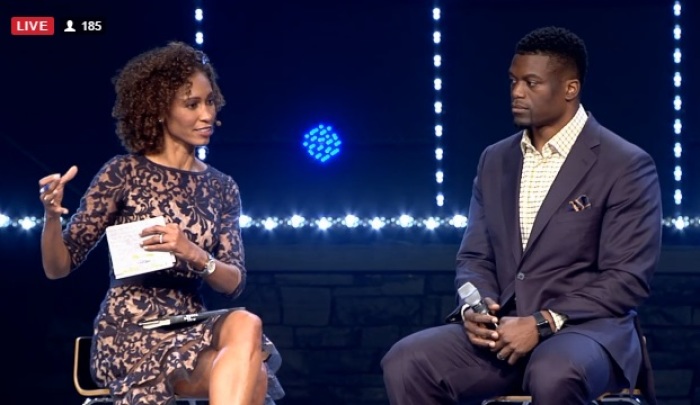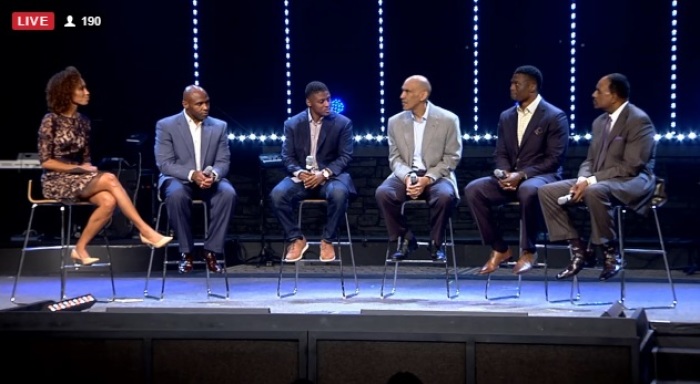Biracial ESPN Anchor Says Worst Racism She Receives Comes From Black People

In a frank discussion at a megachurch on how Christians can bridge the racial divide in their communities, ESPN anchor Sage Steele asserted that African-Americans must look in the mirror before they can point fingers at other races.
Steele, who has a black father, a white mother and is married to a white man, mentioned how accountability was always a big thing in her family since her father graduated from West Point and served as a colonel in the Army. She implied that there might be an accountability issue with some in the black community.
"There are times that I believe that we, as African-Americans, can be hypocritical, and that is to not look ourselves in the mirror when we are saying certain things and blaming other groups for one thing when we are doing the exact same thing," Steele, the lead host of EPSN's "SportsCenter on the Road" and ABC's "NBA Countdown," stated during the "Under Our Skin" forum on race and faith held at The Crossing Church in Tampa that was sponsored by Tyndale House Publishers
"The worst racism that I have received [as a biracial woman married to white man], and I mean thousands and thousands over the years, is from black people, who in my mind thought would be the most accepting because there has been that experience," the 44-year-old anchor stated. "But even as recent as the last couple of weeks, the words that I have had thrown at me I can't repeat here and it's 99 percent from people with my skin color. But if a white person said those words to me, what would happen?"
Steele, who moderated the forum, continued the discussion by posing two questions: "How do we, [with Christianity] as our foundation, address this honestly with each other and these communities? Because to me, if we don't start with ourselves in any issue, how can you point the fingers at somebody else?"
Named after the popular 2015 book written by Ravens tight end Benjamin Watson, the forum included other prominent sports figures like Tony Dungy, the first black head coach to win a Super Bowl, former Tampa Bay Buccaneers running back Warrick Dunn, CBS sportscaster James Brown and University of South Florida head football coach Charlie Strong.
Dunn, who played six seasons with the Buccaneers and six seasons with the Atlanta Falcons, explained that he grew up in an environment in Louisiana where "blacks condemned each other" and didn't hold themselves to a "higher standard."

"I think we have to look at ourselves in the mirror and really challenge ourselves to be better and educate ourselves to understand that there are proper ways of teaching ourselves to treat one another with respect," Dunn said. "I think it's a generational gap. This is generational — years and years and years. I think that is tough to overcome because some people just don't know any better because they are ignorant. If you take a minute to step back and not react and learn and educate yourself, you can look at life a lot different and better."
"I just tried to live in a way that I'm not judging anyone else who comes around me," Dunn continued. "I judge them by the actions they [commit] and not the content of their skin."
Dungy, who explained earlier in the panel that he almost quit football because of racism while in high school, asserted that the key to bridging the racial divide in America is parents teaching their kids the right way to treat people.
"We have to start with ourselves and our families. We have got to teach our kids that there is a way you treat people. It doesn't matter if they're black, white, rich, poor, educated, uneducated. There is a certain level [of respect] because that is what we do, because that is what Christ says we should do," Dungy said. "I totally agree with you. We can't expect everybody else play by certain rules and we don't. We can't expect to treat people wrongly and not expect people to treat us wrongly. I think it's got to start with us in our families and spread out."
Watson weighed in by stating that Americans need to approach the subject of race from the middle, acknowledge the truths and not be so quick to jump on one side or the other.
"We live in a culture where you are either there or you're there but you can't acknowledge the truth of either one," Watson said. "You can't say that, 'Yes, folks. We need our daddies at home. We need you to do your job.' We can't also then say, 'It's also messed up that white families have a networth that is 14 times what black families [have].' Can we say both? Can both be true? Yes."
"I mentioned in my [Facebook] post that I was embarrassed by the violent protesting and the looting and people burning people's cars because of what happened [in Ferguson, Missouri]. Can I condemn that and can I also say, 'You know what? I don't understand why it takes 17 bullets in Chicago to kill a black man on the street.' Can I say that? They can both be true," Watson continued. "As black people and as white people, we need to look at truth for what it is. It's not tinted or tainted by a certain perspective. It is what it is."
Watson said earlier in the forum that parents need to teach their children about the ongoing social issues of the day without any slant or bias. He stressed that black communities need to be able to "control what we can control" and push for change in areas that they can't control.
"There is a lot that we can control and a lot of that is out of our control that we need some of you all to realize and fight for because you are in the position to do so," Watson said.




























